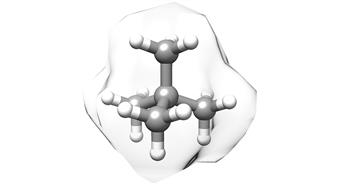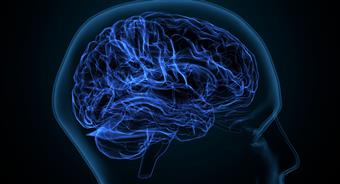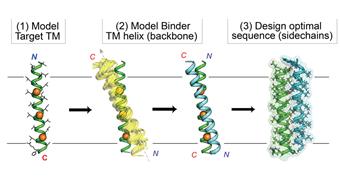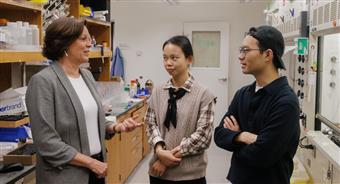
Mouse model develops Parkinson's just like humans, opening the door to more accurate drug screening
April 04, 2019
LA JOLLA, CA To study a disease, scientists need to be able to track its progression in a living organism, such as a mouse. But scientists studying Parkinson's disease have found it challenging to design a genetic animal model that mimics specific aspects such as progressive neuronal cell death, motor symptoms and behavioral changes seen in the inherited form of Parkinson's disease.
Now, scientists at Scripps Research have found a way to tweak the mouse genome to make a mouse model that better mimics Parkinson's disease in humans. The new research, published in the Nature journal Communications Biology, will make it possible to screen drug candidates more reliably and investigate the root cause of the disease.
This is the first mouse model that really reflects one form of inherited Parkinson's disease, says Steven Reed, PhD, a professor at the Department of Molecular Medicine. This is a better model for testing if a drug really has an impact.
It has been known for some time that people who inherit mutations in the gene that encodes a protein called parkin develop the disease at an early age. However, scientists have found that when the gene for parkin is mutated in mice, the mice do not get the disease. This was a frustrating problem because it limited the tools available to study the disease.
The researchers in the new study aimed to find a more useful mouse model. They built on their previous work, which showed parkin works together with two other proteins, Fbw7 and Mcl-1, in a pathway that protects neurons from apoptosis, the kind of cell death that causes Parkinson's symptoms. The work predicted that when parkin is mutated, neurons should have less Mcl-1, leading to their death.
To their surprise, experiments spearheaded by Scripps Research staff scientist and study first author Susanna Ekholm-Reed, PhD, revealed that when parkin is mutated in mice, neurons are actually rewired to produce more Mcl-1. The increased Mcl-1 has a neuroprotective effect and compensates for the lack of parkin, preventing Parkinson's-like symptoms from developing something that apparently doesn't happen in humans.
Next, the researchers studied what happened if they removed one copy of the gene that encodes Mcl-1 in the mice. The results were striking.
Like human patients, the mice developed Parkinson's gradually. The disease takes 20 to 30 years to develop in humans, and it took about a year to develop in the mice. That is about equivalent in terms of the mouse time scale, says Reed. Our study provides proof-of-concept that this pathway really exists in live organisms.
This was an exciting finding, and it shows the potential advantage of using this model over other Parkinson's models.
While scientists today can mimic the symptoms of the disease by using toxins that rapidly kill mouse brain cells, these models do not show the same slow disease progression seen in human patients and drug developers can't study how their therapies could affect disease progression. The new mouse model would more closely simulate the true nature of Parkinson's.
The new mouse model also shows similar motor control symptoms as humans with Parkinson's. This was clear in an experiment where the mice had their paws painted to track where they placed their feet as they walked.
One of the clear symptoms of human Parkinson's disease is a gait problem, where patients walk in a very characteristic staggering kind of way, says Reed. So it's interesting that the mouse model of the disease also reflects that.
Now that the scientists have solved one big problem in Parkinson's research, they are planning to move on to a lingering question in the field: why do only certain neurons die in Parkinson's patients?
The brain cells that die are the dopamine-producing neurons in a region that controls motor function, called the substantia nigra. Scientists know the die-off can be caused by parkin mutations, but parkin is expressed in all cells throughout the body. So why is this region so vulnerable?
The new mouse model also has cell die-off in this brain region, giving researchers a chance to test their theories and even screen drug molecules that may prevent the disease from taking hold.
We are working on using the information on the pathway we found to develop small molecules that target Fbw7 and could be effective in slowing the progression of Parkinson's disease, Reed says.
Additional authors of the study, Reducing Mcl-1 gene dosage induces dopaminergic neuronal loss and motor impairments in Park2 knockout mice, were Robert Baker, David Stouffer, Martha Henze, Jeanne F. Loring and Elizabeth A. Thomas of Scripps Research; and Alexandre R. Campos and Dieter A. Wolf of Sanford Burnham Prebys Medical Discovery Institute.
This study was supported by the National Institutes of Health (grants NS059904 and GM105802) and the California Institute for Regenerative Medicine (CIRM, grant DISC2-09073).
Molecular Medicine Reed, Steven
More from Scripps
12/04/2024
Scripps Research chemists devise easier new method for making a common type of building block for drugs Scientists transform simple linear amines into saturated...
06/04/2024
A simple, inexpensive way to make carbon atoms bind together A Scripps Research team uncovers a cost-effective method for producing quaternary carbon molecules,...
04/04/2024
Developing a vaccine for the zombie drug xylazine Scripps Research chemical biologists design an early proof-of-concept vaccine that could lead to the first...
30/03/2024
How blocking a neural receptor responsible for addiction could reduce alcohol use A Scripps Research team found that a new therapeutic that targets the kappa op...
13/03/2024
New computational strategy boosts the ability of drug designers to target proteins inside the membrane Customized-design approach could streamline the design of...
29/02/2024
Scripps Research scientists reveal how first cells could have formed on Earth New phospholipid discovery brings researchers closer to understanding how primordi...
29/02/2024
How molecular handedness emerged in early biology Scripps Research chemists fill a major gap in origin-of-life theories.
February 28, 2024
LA JOLLA, CA Mole...
22/02/2024
Snaking toward a universal antivenom Scripps Research scientists discovered antibodies that protect against a host of lethal snake venoms.
February 21, 2024
...
06/02/2024
Calibr-Skaggs announces expansion of option and license agreement with AbbVie to develop novel cell therapies for solid tumors and autoimmune diseases
AbbVie...
26/01/2024
Re-energizing mitochondria to treat Alzheimer's disease Scripps Research team restored neuron-to-neuron connections in human cells.
January 25, 2024
LA JO...
24/01/2024
100 years of Science Changing Life: Scripps Research celebrates a century of transforming human health For the last century, institute leaders and renowned scie...
23/01/2024
New technology lets researchers track brain cells' off switches The method could shed light on what goes awry in numerous brain conditions when neurons ar...
09/01/2024
Three decades of giving: Announcing the Calibr-Skaggs Institute for Innovative Medicines The ALSAM Foundation, founded by the Skaggs family, provides lasting g...
04/01/2024
Life science entrepreneur Gene Lay joins Scripps Research Board of Directors Lay, founder of the global biotech company BioLegend, brings invaluable experience ...
21/12/2023
Taming a plant-derived toxin Scripps Research team modifies the traditional poison picrotoxinin for potential neurological drugs and anti-parasite treatments. ...
19/12/2023
Scripps Research Executive Vice President Eric Topol gives TED talk on transformative power of AI in medicine Topol provides an overview of how AI models can i...
13/12/2023
New AI-powered algorithm could better assess people's risk of common heart condition Early detection of atrial fibrillation can reduce the risk of stroke an...
07/12/2023
Nanoparticle flu vaccine design shows promise in early tests Scripps Research-designed vaccine could provide broad, enduring protection against influenza A str...
16/11/2023
Numerous Scripps Research scientists named Highly Cited Researchers Clarivate's annual, global list represents researchers who have demonstrated significant...
07/11/2023
Multiple sclerosis drug invented at Scripps Research slows long-term devastating disease progression Late-breaking data reinforces the effectiveness and safety ...
05/10/2023
Keren Lasker named a 2023 Moore Inventor Fellow The prestigious award will support Lasker's inventive research in membraneless organelles and their applica...
22/09/2023
Michael Bollong named a 2023 Amgen Young Investigator The prestigious award will support Bollong's research identifying new molecular targets and therapeuti...
09/09/2023
Philip Dawson receives 2024 American Chemical Society National Award Dawson is honored with the Arthur C. Cope Late Careers Scholar Award for his foundational c...
07/09/2023
Scripps Research chemists devise a method for C-H activation of alcohols The method represents a new toolkit for making drugs and other compounds.
September 06...
31/08/2023
Scripps Research receives $1.5M to surveil infectious disease threats in wastewater Bill & Melinda Gates Foundation award to support the development of multi-pa...
16/08/2023
How cold temperatures trigger the brain to boost appetite Scripps Research scientists' discovery could lead to new weight loss and metabolic health treatmen...
08/08/2023
Human antibody that targets carfentanil, fentanyl and related opioids reverses overdose effects in preclinical study Scripps Research-developed antibody therapy...
04/08/2023
How sensory neurons impact the gut Scripps Research scientists show that the receptor PIEZO2 in sensory neurons controls gut motility and transit time, which a...
26/07/2023
AbbVie and Calibr Expand Strategic Collaboration to Advance Several Preclinical and Early-stage Clinical Assets The expanded strategic collaboration will advan...
23/07/2023
Scripps Research scientists develop AI-based tracking and early-warning system for viral pandemics Machine-learning system effectively predicts emergence of pro...
19/07/2023
Monitoring T cells may allow prevention of type 1 diabetes Scripps Research study shows that analyzing T cells in blood samples could be used to select at-risk ...
19/07/2023
Scripps Research mourns passing of leading organic chemist Albert Eschenmoser Eschenmoser pioneered key reactions in synthetic chemistry and shaped the understa...
15/06/2023
Scripps Research awarded $46.8 million by NIH to promote human health through innovative translational science and training The Translational Institute is harne...
13/06/2023
Scripps Research's Danielle Grotjahn named 2023 Pew Scholar in the Biomedical Sciences The award will support Grotjahn's study of how cells assemble the...
31/05/2023
Crossing the ring: new method enables C-H activation across saturated carbocycles Scripps Research chemists add another powerful tool to their molecular editin...
24/05/2023
Scripps Research develops behind-the-scenes tool for better biomedical data discovery The new resource makes datasets more discoverable for life science communi...
19/05/2023
Scripps Research neuroscientist Hollis Cline elected to American Academy of Arts and Sciences Cline is recognized for her discoveries about the role of sensory ...
19/05/2023
Scripps Research's Skaggs Graduate School awards doctoral degrees to 31st graduating class Commencement ceremony will be livestreamed via Zoom and on instit...
13/05/2023
A better route to benzocyclobutenes, sought-after building blocks for drugs Scripps Research chemists devise a new, C-H activation-based method for the synthesi...
09/05/2023
Renowned Scripps Research professor Jeffery Kelly elected to National Academy of Sciences Kelly's groundbreaking work on protein misfolding has led to thera...
28/04/2023
Mirror-image molecules pave new path for cancer drug discovery By comparing how mirror image versions of small molecules impact clusters of proteins, Scripps R...
22/04/2023
How alcohol consumption contributes to chronic pain A Scripps Research team showed how both alcohol intake and alcohol withdrawal can lead to increased pain and...
21/04/2023
Xin Jin receives dual awards to study autism risk genes in neurodevelopment Major grants from the National Institutes of Health and California Institute for Reg...
20/04/2023
Trim the sugar: New HIV vaccine design improves immune response Scripps Research vaccine candidate headed for clinical trials.
April 19, 2023
LA JOLLA, CA A...
18/04/2023
Therapeutic can seek and destroy potent opioid to treat overdoses Scripps Research chemists developed a new biologic to work against the synthetic opioid carfen...
07/03/2023
How heavy alcohol consumption increases brain inflammation The findings by a Scripps Research team point toward a potential new drug target for treating alcohol...
02/03/2023
Scientists find human antibodies that can block multiple coronaviruses including SARS-CoV-2 Results from a Scripps Research and UNC team pave the way for a vacc...
28/02/2023
$10 million grant funds Scripps Research Alcohol Research Center through its 50th year The five-year grant supports research into the neurobiology of alcohol us...
28/02/2023
Immune system drug shows promise in treating alcohol use disorder, a Scripps Research clinical trial reports Scientists at Scripps Research found that apremilas...
23/02/2023
Chemically poisoned protein acts as a molecular switch to spur cancer formation The discovery triggered development of a new potential drug to eliminate tumor...
 Mouse model develops Parkinson's just like humans, opening the door to more accurate drug screening
Mouse model develops Parkinson's just like humans, opening the door to more accurate drug screening 
























